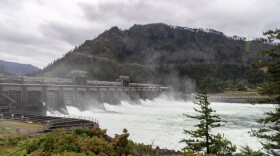Washington’s campaign to aggressively curb climate-damaging air pollution entered a new phase Thursday with a decision to pursue linking the state’s carbon market with ones in California and Québec.
Washington Director of Ecology Laura Watson made the expected announcement, calling it “the best path” to addressing the “moral imperative of protecting Washington and the planet from dangerous greenhouse gas emissions.”
Combining markets, or “linkage,” would ensure a durable carbon market that will allow the state to attain its emission reduction targets in the next 25 years, she said.
If the move pans out, she envisions businesses will pay less for pollution allowances needed to comply with the state’s climate rules and can share those savings with consumers.
And, she cited her agency’s analysis that a larger, linked market would bring more predictability to allowance prices and provide businesses a greater incentive to step up investments to slash their greenhouse gas emissions.
The decision allows the state to begin conversations with California and Québec – which merged markets in 2014 – to determine their interest in linking with Washington. Harmonizing the three programs will likely require revising some rules in each place, so combining the markets is not expected before 2025.
Watson formally notified Gov. Jay Inslee of her recommendation in a letter Thursday.
Inslee called the decision “good – and important — news. Joining with other governments in the same fight is the most effective way to reduce pollution, save our planet, and give our kids a livable future.”
Good and bad
Watson’s decision elicited a range of reactions across the political spectrum.
An “excited” Sen. Joe Nguyễn, D-White Center, chair of the Senate Environment, Energy & Technology Committee, said in a statement that “this is a crucial step forward for the stability of our cap-and-invest program.”
Many environmentalists cheered.
“Washington’s desire to pursue collaboration with California and Québec underscores the state’s commitment to being a long-term climate leader and securing the strongest possible future for its communities,” said Caroline Jones, senior analyst for U.S. Climate at the Environmental Defense Fund.
But Rep. Mary Dye, R-Pomeroy, ranking Republican on the House Environment and Energy Committee, voiced concern that consumers will be harmed, not helped.
“California has the highest gas prices in the country and the third highest retail electricity rates in the country,” Dye said in a statement. “Moving forward, the burden will be high to convince me that beginning to tie our state’s energy markets together would not hurt affordability for Washington families and competitiveness for our employers.”
Front and Centered, a nonprofit coalition of equity, environmental and climate justice organizations, has been a vocal critic.
“Linking carbon markets will only exacerbate the game of trading pollution in markets for the financial benefit of polluters, rather than focusing on the need to make tangible changes here in Washington State that address the harm continued pollution inflicts on our frontline communities,” Nico Wedekind wrote in a post on the group’s website last week.
How it works
The 2021 Climate Commitment Act requires Ecology to seek out a union with the joint California-Québec market, which is about six times the size of Washington’s in terms of total pollution allowances.
If a merger occurs, each entity would operate its own allowance auctions but they would be conducted at the same time and have the same price per allowance.
Allowances could be used to cover emissions in any of the three jurisdictions, regardless of where they are bought. Market participants could also trade allowances across jurisdictions — meaning a business in Washington could sell allowances to a business in California, for example.
An economic analysis done last year for Ecology concluded the cost of a Washington allowance in a linked market would likely be closer to prices in the California-Québec market which have been notably lower than Washington’s.
“Linking really was intended to be the key price containment mechanism” in the Climate Commitment Act, Watson said Thursday.
Only the beginning
With Watson’s decision, Washington can formally approach California and Québec about a partnership. There will be wrinkles to iron out.
Ecology is likely to need tweaks in the Climate Commitment Act to ensure consistency in how the markets are run. For example, the percentage of allowances any one entity can buy in an auction is lower in Washington than in California and Québec. That may need to change.
And Ecology must conduct more research and analysis to show how this move “will provide for a more cost-effective means for covered entities to meet their compliance obligations in Washington while recognizing the special characteristics of the state’s economy, communities, and industries.”
It also must review and determine whether there are provisions ensuring vulnerable communities are not overlooked and receive their share of benefits in all three jurisdictions.
Wedekind of Front and Centered doesn’t think it’s possible.
“Our assessment is that linkage is not appropriate, as it will yield net adverse impacts to highly impacted communities and will negatively affect Washington’s abilities to achieve its stated emission reduction limits,” he wrote.
Supporters recognize the importance of this issue.
Jones, of the Environmental Defense Fund, said it is “critical” for Ecology to engage with those living in communities hardest hit by pollution.
A merging of markets does put the state in a position “to increase ambition on climate and environmental justice in all three jurisdictions,” Kelly Hall, Washington Policy Director for Climate Solutions, said in a statement.
But, to realize such benefits, Ecology must “prioritize protections for vulnerable populations, and maintain the integrity of our climate mandates as it seeks to merge its market.”
Washington State Standard is part of States Newsroom, a nonprofit news network supported by grants and a coalition of donors as a 501c(3) public charity. Washington State Standard maintains editorial independence.






